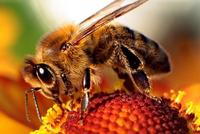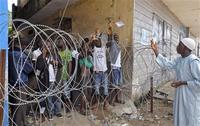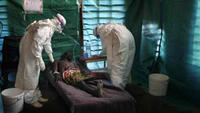-
Research predicts possible 6,800 new Ebola cases this month
New research predicts new Ebola cases could reach 6,800 in West Africa by the end of the month if new control measures are not enacted. The researchers also discovered through modeling analysis that the rate of rise in cases significantly increased in August in Liberia and Guinea, around the time that a mass quarantine was put in place, indicating that the mass quarantine efforts may have made the outbreak worse than it would have been otherwise.
-
-
Old drug may hold key to new antibiotics
Scientists have found that an anticonvulsant drug may help in developing a new class of antibiotics. Although dozens of antibiotics target what bacteria do, the scientists have looked at how a certain part of bacteria are created, and they found there is a way of stopping it.
-
-
Botulism’s genetic triggers found
Clostridium botulinum bacteria produce the most deadly toxin we know of. Botulinum spores are found throughout the environment. If they contaminate food, under certain conditions they can germinate and reproduce in our food, and generate a neurotoxin. Scientists from the U.K. Biotechnology and Biological Sciences Research Council (BBSRC) strategically funded Institute of Food Research have discovered genes that are crucial for its germination, which may present a new way of stopping these deadly bacteria growing in our food.
-
-
Scientists develop a new way to prevent the spread of deadly diseases
For decades, researchers have tried to develop broadly effective vaccines to prevent the spread of illnesses such as HIV, malaria, and tuberculosis. While limited progress has been made along these lines, there are still no licensed vaccinations available that can protect most people from these devastating diseases. So what are immunologists to do when vaccines just aren’t working? Whereas vaccines introduce substances such as antigens into the body hoping to illicit an appropriate immune response — the generation of either antibodies that might block an infection or T cells capable of attacking infected cells — Caltech scientists have approached the problem in a different way: Why not provide the body with step-by-step instructions for producing specific antibodies that have been shown to neutralize a particular disease?
-
-
Ebola outbreak “out of all proportion” and severity cannot be predicted
A mathematical model that replicates Ebola outbreaks can no longer be used to ascertain the eventual scale of the current epidemic, researchers find. When applying the available data from the ongoing 2014 outbreak to the model, it is “out of all proportion and on an unprecedented scale when compared to previous outbreaks,” says the model developer.
-
-
People living near “fracking” sites report more health symptoms
Little is known about the environmental and public health impact of certain natural gas extraction techniques — including hydraulic fracturing, also known as “fracking” — that occur near residential areas. A Yale-led study has found a greater prevalence of health symptoms reported among residents living close to natural gas wells, including those drilled by hydraulic fracturing.
-
-
Cheap, easy-to-install water purifying system for remote communities
About 1.5 million people — and 90 percent of them children — die every year from consuming untreated or contaminated water. University of Adelaide mechanical engineering students and staff have designed a low-cost and easily made drinking water treatment system suitable for remote communities in Papua New Guinea (PNG) — using foil chip packets and some glass tubing.
-
-
Bacteria from bees as possible alternative to antibiotics

Thirteen lactic acid bacteria found in the honey stomach of bees have shown promising results in a series of studies. The group of bacteria counteracted antibiotic-resistant MRSA in lab experiments. The bacteria, mixed into honey, have healed horses with persistent wounds. The formula has previously been shown to protect against bee colony collapse.
-
-
Ebola outbreak has “completely outstripped the Liberian government’s capacity to respond”: WHO

The World Health Organization (WHO) has released a statement Monday saying problems related to the Ebola outbreak in Liberia are increasingly dire. Transmission of the Ebola virus in Liberia is already intense and the number of new cases is increasing exponentially. Experts working for WHO and other organizations all agree that the demands of the Ebola outbreak have completely outstripped the Liberian government’s and partners’ capacity to respond.
-
-
Bacteria pack secret weapons against antibiotics
The ability of pathogenic bacteria to evolve resistance to antibiotic drugs poses a growing threat to human health worldwide. Scientists have now discovered that some of these microscopic enemies may be even craftier than we suspected, using hidden genetic changes to promote rapid evolution under stress and developing antibiotic resistance in more ways than previously thought.
-
-
Johnson & Johnson accelerates Ebola vaccine program
Johnson & Johnson last week announced it will fast-track the development of a promising new combination vaccine regimen against Ebola and collaborate with its partners to address the current Ebola outbreak. The accelerated vaccine program features a prime-boost regimen, in which one vector is used to prime and the other to boost the immune response. It consists of two vaccine components that are based on AdVac technology from Crucell N.V.(part of the Janssen pharmaceutical companies of Johnson & Johnson, based in the Netherlands) and the MVA-BN technology from Bavarian Nordic (a biotech company, based in Denmark).
-
-
Effective Ebola vaccine may be available sooner rather than later: Scientists
Scientists have said they were cautiously optimistic that an effective Ebola vaccine may be available sooner rather than later after trials of an experimental jab found that it gave monkeys long-term protection from the disease. U.S. government researchers said that animals which received a first shot of the vaccine and a booster two months later were immune to the infection for ten months. If additional trials show that the vaccine works safely in humans, it could be used to protect health workers and contain future outbreaks by immunizing villagers living next to affected areas.
-
-
New gene therapy approach offers better treatment of botulism exposure, other illnesses
The current method to treat acute toxin poisoning is to inject antibodies, commonly produced in animals, to neutralize the toxin. This method, however, has challenges ranging from safety to difficulties in developing, producing and maintaining the anti-serums in large quantities. New research shows that gene therapy may offer significant advantages in prevention and treatment of botulism exposure over current methods, and may have applicability to other illnesses.
-
-
Ricin toxin vaccine shows promise in a non-human primate study
Ricin toxin is a plant toxin thought to be a bioterror threat because of its stability and high potency as well as the large worldwide reservoir created as a by-product of castor oil production. As a poison, ricin is so potent that the U.S Centers for Disease Control (CDC) estimates the lethal dose in humans is about the size of a grain of salt. There are currently no effective means to prevent the effects of ricin poisoning. Soligenix, Inc., a clinical stage biopharmaceutical company developing several biodefense vaccines and therapeutics, announced last week promising preliminary results from a preclinical study with its ricin toxin vaccine RiVax, in a non-human primate (NHP) lethal aerosol exposure model.
-
-
HHS awards $24.9 million contract to accelerate development of Ebola drug

The development of a medication to treat illness from Ebola will be accelerated under a contract with the U.S. Department of Health and Human Services’ Office of the Assistant Secretary for Preparedness and Response (ASPR). HHS says that this contract supports the government-wide response to the Ebola outbreak in West Africa. The $24.9 million, 18-month contract with Mapp Biopharmaceutical Inc., of San Diego, California, may be extended up to a total of $42.3 million. HHS notes that it is seeking additional proposals for the advanced development of antibody treatments, antiviral drugs, and vaccines against the Ebola and Marburg viruses.
-
More headlines
The long view
A Shining Star in a Contentious Legacy: Could Marty Makary Be the Saving Grace of a Divisive Presidency?
While much of the Trump administration has sparked controversy, the FDA’s consumer-first reforms may be remembered as its brightest legacy. From AI-driven drug reviews to bans on artificial dyes, the FDA’s agenda resonates with the public in ways few Trump-era policies have.
